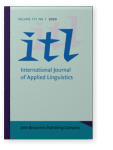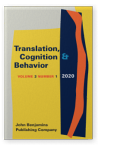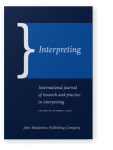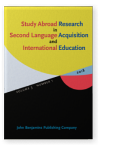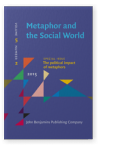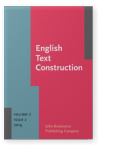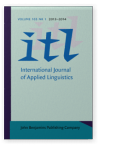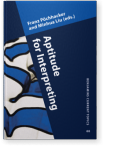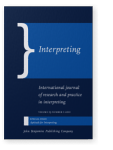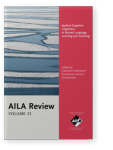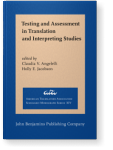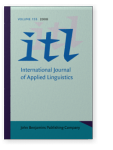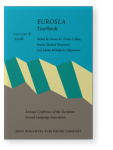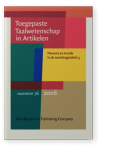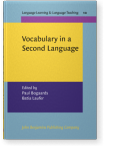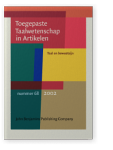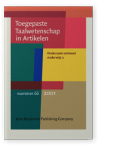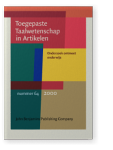June Eyckmans
List of John Benjamins publications for which June Eyckmans plays a role.
Articles
2020 The effect of frequency on learners’ ability to recall the forms of deliberately learned L2 multiword expressions ITL - International Journal of Applied Linguistics 171:1, pp. 2–33 | Article
In incidental learning, open class vocabulary items with high or relatively high objective frequency in input are comparatively likely to be acquired. However, many single words and most multiword expressions (MWEs) occur infrequently in authentic input. It has therefore been argued that learners… read more
2020 Choosing to become an interpreter: A matter of personality and memory capacity? Translation, Cognition & Behavior 3:1, pp. 25–50 | Article
Within the world of interpreting, persistent clichés exist about an interpreter’s required personality and cognitive traits. For instance, an interpreter is thought to be communicative, stress-resistant and to have excellent memory skills. Yet, while research has been conducted into interpreters’… read more
2019 Investigating the presumed cognitive advantage of aspiring interpreters Interpreting 21:1, pp. 115–134 | Article
In complex tasks such as interpreting, the importance of a well-functioning working memory can hardly be overestimated. However, empirical studies have failed to produce consistent results with regard to an interpreter advantage in working memory. Recent studies tend to focus on the executive… read more
2018 Self-perceived linguistic progress, target language use and personality development during study abroad Study Abroad Research in Second Language Acquisition and International Education 3:1, pp. 144–166 | Article
This exploratory study investigates the development of personality dimensions related to multicultural effectiveness and its relation to amount of target language use and self-perceived progress in speaking during a sojourn abroad in seven European countries. The participants were 59 Swedish and… read more
2015 Review of Nacey (2013): Metaphors in Learner English The political impact of metaphors, Perrez, Julien and Min Reuchamps (eds.), pp. 290–294 | Review
2014 Looking for form-meaning motivation in new L2 words: A think-aloud study among proficient learners of English English Text Construction 7:2, pp. 249–280 | Article
In a previous, effect-of-instruction study (Deconinck et al. 2010), we reported on the benefits for word learning of an intervention which prompts learners to evaluate the extent to which a novel word’s meaning is congruent with its form. However, that study did not explore the nature of the… read more
2014 How big is the positive effect of assonance on the recall of L2 collocations? ITL - International Journal of Applied Linguistics 165:1, pp. 19–45 | Article
High proficiency in L2 partly depends on acquiring many formulaic sequences (FSs), yet post-childhood learners find this difficult. Ways of accelerating the acquisition of FSs would be welcome. Small-scale studies have indicated that assonance (e.g., strong bond) makes studied FSs especially… read more
2014 A story of attitudes and aptitudes? Investigating individual difference variables within the context of interpreting Aptitude for Interpreting, Pöchhacker, Franz and Minhua Liu (eds.), pp. 55–70 | Article
Unlike in the early days of interpreter training, most student interpreters nowadays are still in the process of acquiring their target language(s), which raises questions as to which skills — linguistic as well as non-linguistic — may be required at the outset of interpreter training. This study… read more
2011 A story of attitudes and aptitudes? Investigating individual difference variables within the context of interpreting Aptitude for Interpreting, Shlesinger, Miriam † and Franz Pöchhacker (eds.), pp. 53–69 | Article
Unlike in the early days of interpreter training, most student interpreters nowadays are still in the process of acquiring their target language(s), which raises questions as to which skills — linguistic as well as non-linguistic — may be required at the outset of interpreter training. This study… read more
2010 Helping learners engage with L2 words: The form–meaning fit Applied Cognitive Linguistics in Second Language Learning and Teaching, Littlemore, Jeannette and Constanze Juchem-Grundmann (eds.), pp. 95–114 | Article
The pace at which new words are acquired is influenced by the degree of engagement with them on the part of the learner. Insights from cognitive linguistics into the non-arbitrary aspects of vocabulary can be turned into stimuli for such engagement. The majority of Cognitive Linguists’ proposals… read more
2009 The perks of norm-referenced translation evaluation Testing and Assessment in Translation and Interpreting Studies: A call for dialogue between research and practice, Angelelli, Claudia V. and Holly E. Jacobson (eds.), pp. 73–93 | Article
2008 Pour Une Évaluation Normative De La Compétence De Traduction ITL - International Journal of Applied Linguistics 155, pp. 53–76 | Article
Après un bref aperçu des risques d’infidélité d’une évaluation critériée de la compétence de traduction, liés principalement à la subjectivité du correcteur, nous mettons en évidence les limites des tentatives d’objectivation du processus d’évaluation au moyen de grilles de correction ou… read more
2006 Motivating multiword units: Rationale, mnemonic benefits, and cognitive style variables EUROSLA Yearbook: Volume 6 (2006), Foster-Cohen, Susan H., Marta Medved Krajnovic and Jelena Mihaljević Djigunović (eds.), pp. 169–190 | Article
In recent years, many educational linguists have emphasised the importance of drawing language learners’ attention to multiword units (i.e., strong collocations, idioms, etc.), because knowledge of such units is believed to help learners come across as fluent, native-like and accurate L2 speakers.… read more
2004 4. Etymological elaboration as a strategy for learning idioms Vocabulary in a Second Language: Selection, acquisition, and testing, Bogaards, Paul and Batia Laufer (eds.), pp. 53–78 | Chapter
2002 Mentaal Visualiseren Als Leerstrategie: Het belang van taalbewustzijn bij het verwerven van idiomatische uitdrukkingen in een vreemde taal Taal en bewustzijn, pp. 39–48 | Article
This article reports an experiment in which mental imagery was used as a mnemonic strategy to enhance learners' retention of figurative idioms. Language students in tertiary education were provided with on-line exercises on 120 English idioms. Under the experimental condition, participants were… read more
2001 De Vertekening van het Antwoordgedrag in de JA/NEE Woordenschattoets Onderzoek ontmoet onderwijs 2, pp. 79–90 | Article
This article reports on an experiment in which the Yes/No vocabulary test is used with French-speaking learners of Dutch. In previous experiments with Francophone subjects the data were characterised by high false alarm rates which may be due to a response bias. In the current experiment, we aim… read more
2000 De ja/nee Woordenschattoets: Klaar Voor Gebruik in de Klas? Onderzoek ontmoet onderwijs, pp. 117–128 | Article
The Yes/No vocabulary test seems to be a promising tool for measuring the receptive vocabulary size of foreign language learners. The test consists of items that are either words or pseudowords and the subjects have to indicate whether or not they know the meaning of these items. This article… read more
